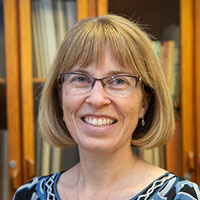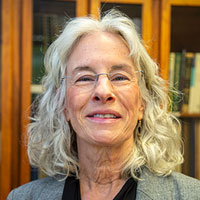
By Katie Essick, CHR Writer and Editor
 Kimberly K. Vesco, MD, MPH
Kimberly K. Vesco, MD, MPH Amanda L. Clark, MD, MCR, NCMP
Amanda L. Clark, MD, MCR, NCMP
Kaiser Permanente Northwest physicians Kim Vesco and Amanda Clark are aware of the often-inadequate training medical residents receive to treat menopause. They also know that residents’ lives are very busy.
Vesco (MD, MPH), an obstetrician-gynecologist and Senior Investigator at the Kaiser Permanente Center for Health Research (KP CHR), and Clark (MD, MCR), a urogynecologist and KP CHR Senior Affiliate Investigator, devised a solution: a six-episode podcast linked with a classroom session to boost resident knowledge and preparedness to treat menopause symptoms.
Menopause, the point 12 months after a person’s last menstrual period, and perimenopause, the transitional period before menopause, are a normal part of aging, but they are associated with a myriad of symptoms.
These include vasomotor symptoms, commonly known as hot flashes and night sweats and experienced by 80% of people going through menopause; genitourinary symptoms such as vaginal dryness, painful sex, urinary frequency, and urinary tract infections (which worsen after menopause); disrupted sleep, “brain fog,” and mood changes; skin and hair changes; joint pain; loss of bone-mineral density; and metabolic changes.
While both hormone and nonhormone therapies are effective in treating symptoms, physicians often do not offer them. That, says Clark, is because clinician training on menopause is lacking. According to results of a national survey, more than 90% of residents in family medicine, internal medicine and OB/GYN do not feel adequately prepared to manage patients experiencing menopause.
Clark and Vesco — who collectively have more than 50 years of experience as OB/GYNs — developed a curriculum for residents (medical school graduates in medical education programs) in internal medicine, family practice, and obstetrics and gynecology. The goal of the curriculum was to boost residents’ knowledge of menopause and to have them gain confidence in treating menopausal symptoms.
Supported by funding from the Pfizer Independent Grants for Learning and Change program, Clark and Vesco worked with Kaiser Permanente Northwest (KPNW) family medicine physician Tovi Anderson, MD, PhD to write and record the podcast, entitled “Practice Pearls Podcast: Menopause.”
The professionally produced podcasts consist of six scripted, conversational episodes — each running from 12-21 minutes — that provide an overview of menopause and associated symptoms, lessons on hormone therapy and nonhormone therapy options, and special considerations (for example, treatment of patients with a history of breast cancer, stopping hormone therapy, and abnormal uterine bleeding).
Vesco and Clark followed guidelines developed by the Endocrine Society, the North American Menopause Society, the American College of Obstetrics and Gynecology, and the U.S. Preventive Services Task Force in developing the curriculum. They partnered with Oregon Health & Science University and Kaiser Permanente graduate medical education offices to implement it.
During the 2019-2020 academic year, 200 residents in OB/GYN and internal and family medicine were invited to listen to the episodes and then attend an interactive classroom session where residents discussed specific case vignettes and practiced treatment decision-making.
After listening to the podcasts and participating in the classroom session, residents in all three specialties demonstrated an increase in knowledge about menopause and menopause treatment and reported higher levels of comfort and preparedness in treating menopausal patients. Correct answers to knowledge questions rose from 61% pre-course to 79% post-course.
More than two-thirds of the residents listened to the podcast on their mobile phones. While available on podcast player apps, most accessed it from the Practice Pearls Podcast website. Seventy-four percent of respondents felt the podcast format was more convenient than the equivalent amount of reading, and 62% felt it was more effective.
The researchers’ report on the study is the lead article in the February 2024 issue of Menopause – The Journal of the North American Menopause Society. They wrote:
“Our findings suggest that a menopause curriculum consisting of six podcast episodes and a case-based classroom session can improve knowledge and preparedness for menopausal care in residents across OB/GYN, family medicine, and internal medicine specialties. The podcast format allows for inexpensive, rapid, and wide dissemination into residency programs.”
Menopause Editor Jennifer T. Allen’s editorial focused on the podcasts and the “flipped classroom” approach, including the study’s relevance “in the ever-changing landscape of medical education.” Allen wrote: “Today, most residents in training belong to Generation Z (born after 1995). Learner attributes for Gen Z are in stark contrast to the previous Millennial (‘Y’) generation, but more than that, they provide new challenges for educators.”
In her conclusion, Allen said, “The curriculum presented in this study is a great start for programs aiming to teach menopause medicine to residents.”
Vesco and Clark received support with the curriculum from KP internal medicine physicians Cora Ludwig, MD, site director of KPNW’s Internal Medicine Residency program, and Shihka Arun, MD, who assisted with creating and delivering the classroom session for internal medicine residents. KP CHR colleagues who contributed to the project were Research Associate and Editor Neon Brooks, PhD; Statistical Research Analyst Melanie Francisco, PhD; Senior Investigator Michael Leo, PhD; former Research Project Manager Mara Kalter, MA; Web Designer Joseph Cerizo, and former Technical Writer and Editor Katie Essick.
To listen to the podcast, visit the Center for Health Research YouTube channel. The series, along with transcripts and additional resources, is also available on CHR’s Practice Pearls Podcast: Menopause page. For Kaiser Permanente members going through menopause and looking for more guidance, Vesco and Clark recommend the Kaiser Permanente Menopause Class. Members can schedule the class through kp.org.